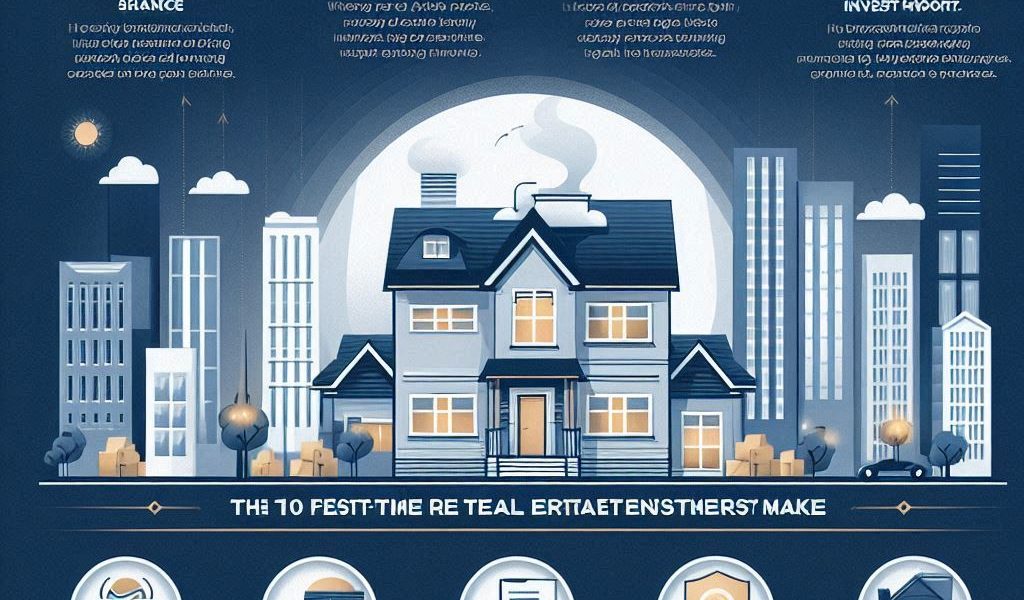Investing in real estate can be a lucrative way to build wealth, but first-time investors often make avoidable mistakes that can lead to financial losses. Whether you’re purchasing a rental property, flipping homes, or investing in commercial real estate, avoiding these common pitfalls is essential to success. This guide highlights the top 10 mistakes new real estate investors make and how to steer clear of them.
1. Failing to Do Proper Research
One of the biggest mistakes is jumping into a deal without conducting thorough research. Understanding the market trends, property values, neighborhood demographics, and future development plans is crucial.
How to Avoid It:
- Conduct a comparative market analysis (CMA) before making an offer.
- Research local rental rates, job growth, and crime rates.
- Speak with real estate professionals, agents, and property managers to gather insights.
2. Not Setting Clear Investment Goals
Investing without a clear strategy often leads to poor decisions. Are you looking for long-term passive income, short-term flips, or appreciation growth?
How to Avoid It:
- Define your investment strategy before buying.
- Set measurable financial goals (e.g., expected return on investment, rental yield, or appreciation rate).
3. Underestimating Costs
Many new investors only account for the purchase price and mortgage but forget additional expenses like maintenance, property taxes, and vacancies.
How to Avoid It:
- Factor in all expenses, including repairs, management fees, insurance, and closing costs.
- Keep a reserve fund for unexpected repairs.
4. Skipping Property Inspections
Buying a property without a professional inspection can lead to costly repairs later.
How to Avoid It:
- Hire a licensed home inspector to assess the property’s condition.
- Be cautious of properties with structural, plumbing, or electrical issues.
5. Overpaying for a Property
New investors sometimes get emotionally attached to a deal and overpay, reducing their profit margins.
How to Avoid It:
- Stick to the 70% rule: Offer no more than 70% of the after-repair value (ARV) minus repair costs.
- Negotiate and compare multiple deals before committing.
6. Ignoring Financing Options
Not exploring different financing options can lead to higher interest rates and unfavorable terms.
How to Avoid It:
- Compare mortgage options (FHA, conventional, private lenders, seller financing, hard money loans).
- Work on improving your credit score to secure better loan terms.
7. Mismanaging Rental Properties
Forgetting about tenant screening, lease agreements, and maintenance can result in bad tenants and financial loss.
How to Avoid It:
- Screen tenants thoroughly (credit check, background check, rental history).
- Have a clear lease agreement that outlines terms and responsibilities.
- Consider hiring a property manager if managing tenants isn’t your strength.
8. Neglecting Legal and Tax Implications
Failing to understand real estate laws, zoning regulations, and tax obligations can lead to legal troubles.
How to Avoid It:
- Consult a real estate attorney for legal guidance.
- Learn about property taxes, deductions, and capital gains taxes.
9. Lack of an Exit Strategy
Not planning an exit strategy can trap investors in a property that no longer meets their financial goals.
How to Avoid It:
- Have multiple exit strategies: renting, selling, refinancing, or lease options.
- Plan for both best-case and worst-case scenarios.
10. Trying to Do Everything Alone
Real estate investing is complex, and going solo without expert advice can be risky.
How to Avoid It:
- Build a team of professionals, including real estate agents, contractors, lenders, and attorneys.
- Join real estate investment groups or mentorship programs to learn from experienced investors.
Final Thoughts: Learning from Mistakes
Real estate investing comes with risks, but avoiding these common mistakes can increase your chances of success. Do your research, plan your strategy, and seek professional guidance to make smart investment decisions. By learning from these errors, you can build a profitable real estate portfolio while minimizing financial risks.




